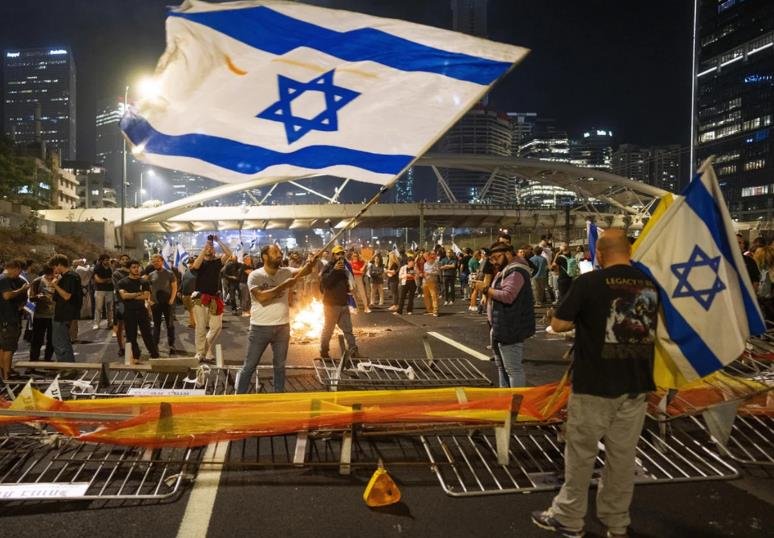Thousands of Israelis took to the streets in Jerusalem and across the country on Wednesday night, voicing their strong opposition to Prime Minister Benjamin Netanyahu’s decision to fire Defense Minister Yoav Gallant. This marks the second consecutive night of protests since Gallant’s dismissal was announced just a day earlier.
In Jerusalem, the protest near the Knesset was electric, with demonstrators chanting and waving signs demanding that Netanyahu reverse his decision. The firing, set to take effect on Thursday evening, came swiftly after Netanyahu handed Gallant a terse one-sentence letter notifying him of his removal from office.
Netanyahu justified his action by citing a breakdown of trust between him and Gallant, claiming it “helped the enemy.” However, many onlookers and political analysts see deeper motives at play. The dismissal is widely perceived as a strategic move by Netanyahu to advance legislation that would exempt ultra-Orthodox men from mandatory military service—a proposal Gallant had openly opposed.
Emotional and Chaotic Scenes Erupt Across Israel
The reaction to Gallant’s firing was immediate and intense. On Tuesday night, spontaneous protests erupted, drawing tens of thousands of participants. Major highways in Tel Aviv and near Jerusalem were shut down in the chaos, causing significant disruptions. While the crowds this time were smaller compared to the massive rallies seen in March 2023 during Netanyahu’s initial attempt to remove Gallant, the passion among protesters remains undiminished.
“I never thought I’d see the day when our Defense Minister would be fired like this,” said Rachel Levin, a Jerusalem resident. “It feels like Netanyahu is undermining the very institutions that protect us.”
The streets were filled with a mix of emotions—anger, frustration, and a sense of betrayal. Many protesters believe that Gallant’s removal is a blatant power play by Netanyahu, aimed at consolidating his control within the Likud Party and pushing through controversial policies without sufficient opposition.

Political Ramifications and Party Dynamics
Netanyahu’s decision has stirred significant turmoil within the Likud Party. Gallant, a longtime member and rival, has been a vocal critic of several of Netanyahu’s policies. His dismissal is seen by many as a move to eliminate dissent within the party ranks.
This internal conflict could have lasting effects on the political landscape in Israel. With Gallant out of the picture, Netanyahu might find it easier to push forward his legislative agenda. However, the backlash from the public could also weaken his position, especially if the protests continue to gain momentum.
Key Political Implications:
- Shift in Party Dynamics: Removal of a key rival may lead to a more unified front for Netanyahu within Likud.
- Public Trust Erosion: Continued protests could diminish public trust in Netanyahu’s leadership.
- Legislative Hurdles: While the immediate path may seem clear, sustained opposition could pose challenges for passing new laws.
Economic Impact of Ongoing Protests
The persistent protests are not just a political issue—they’re also taking a toll on the economy. With major highways and city centers being disrupted, businesses are feeling the strain. Retail stores, restaurants, and local services are experiencing reduced foot traffic, leading to potential revenue losses.
Moreover, the uncertainty surrounding the political stability could deter foreign investment and tourism, sectors that are vital to Israel’s economy. If the protests continue, the economic repercussions could be significant, adding another layer of pressure on Netanyahu’s administration.
| Impact Area | Short-Term Effects | Long-Term Concerns |
|---|---|---|
| Local Businesses | Decreased sales, closures | Potential permanent closures |
| Tourism | Reduced visitor numbers | Long-term decline in tourist appeal |
| Foreign Investment | Hesitation to invest | Possible withdrawal of existing investments |
This table underscores the potential financial setbacks if the protests show no signs of abating. Businesses are calling for swift resolution to restore normalcy and confidence in the economic environment.
Voices from the Ground: Diverse Reactions
The protests have attracted a wide range of participants, each with their own reasons for opposing Gallant’s firing. From military families concerned about national security to political activists fighting for democratic principles, the diversity of voices highlights the multifaceted nature of the discontent.
“I support Gallant because he stood up for what was right,” said Amir Cohen, a veteran and father of two. “Netanyahu’s actions are not just political; they threaten our security and the integrity of our government.”
On the other hand, some Netanyahu supporters argue that the Prime Minister has the right to make executive decisions that he believes are in the best interest of the country. They view Gallant’s dismissal as a necessary step to implement needed reforms.
International Reactions and Future Outlook
The international community is watching Israel closely as these events unfold. Allies and observers are keen to see how Netanyahu navigates this political crisis and whether he can maintain stability amidst growing internal dissent.
Analysts predict that the coming weeks will be crucial in determining the future direction of Netanyahu’s leadership. If the protests continue to escalate, there could be calls for greater accountability and potential shifts in government policies.
